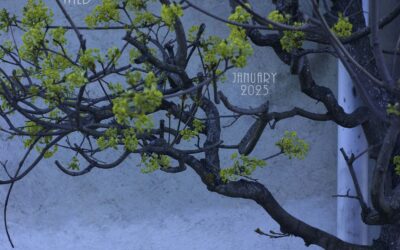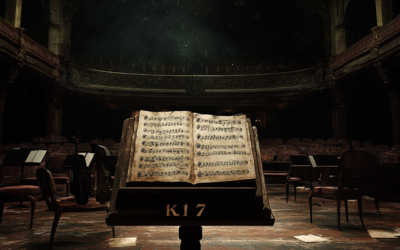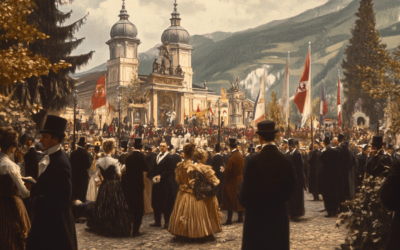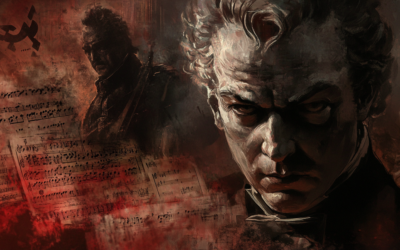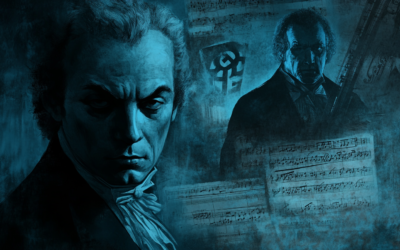A Modern Premiere in Germany
Pacini’s Medea Brought to Life
Giovanni Pacini’s Medea, revised by Luca Bianchini and Anna Trombetta, made its modern premiere in Germany at the Theater für Niedersachsen. This monumental work was performed in full, marking a triumphant revival of Pacini’s forgotten genius.
Mozart: The Fall of the Gods
This book offers a fresh and critical look at the life of Wolfgang Amadeus Mozart, challenging the myths that have surrounded him for centuries. We strip away the romanticised image of the “natural genius” and delve into the contradictions within Mozart’s extensive biographies. Backed by nearly 2,000 meticulously sourced citations, this work invites readers to explore a deeper, more complex understanding of Mozart. Perfect for those who wish to question the traditional narrative, this biography is a must-read for serious music lovers and historians.
"Pacini’s Medea returns to the stage, reminding us that some of the most powerful operatic works have yet to receive the recognition they deserve."
@MozartrazoM
For the first time in Germany, Giovanni Pacini’s monumental opera Medea has been performed in a modern premiere at the Theater für Niedersachsen in Hildesheim. This captivating work, filled with both horror and compassion, was masterfully revived thanks to the new edition transcribed and revised by musicologists Luca Bianchini and Anna Trombetta. The edition, comprising nearly 1,500 pages of score and sheet music, restores the grandeur of Pacini’s forgotten masterpiece.
The opera, which was performed in its entirety under the baton of Maestro Florian Ziemen, received enthusiastic acclaim during its premiere, with several more performances scheduled in the weeks following. Originally premiered in 1843 to great success, Medea once again demonstrated its powerful impact on audiences, blending dramatic intensity with Pacini’s masterful composition.
This modern revival highlights how Pacini, unjustly neglected in music history, deserves to stand among the greats of opera. The character of Medea, both terrifying and pitiful, remains one of the most complex and fascinating figures in opera, and Pacini’s setting captures every nuance of this tragic tale.
You May Also Like
Constanze Mozart’s Enduring Love
Although some have doubted her devotion, Constanze’s own words and actions illustrate a widow deeply committed to preserving Mozart’s legacy. Diaries, personal correspondence, and eyewitness testimony all challenge the notion that she neglected his memory—while the circumstances around his burial grow ever more perplexing.
A Revealing New Interview on His Thematic Catalogue
We’re excited to present a brand-new interview that challenges many of the long-held assumptions about Mozart’s Thematic Catalogue (1784–1791). Conducted by Swedish journalist Henry Grynnsten, this conversation delves into groundbreaking forensic techniques—like advanced ink analysis and digital image processing—that may change the way we view Mozart’s late works.
The Rattling Symphony: A Critical Take on K. 17
Often attributed to Mozart, the K. 17 symphony is anything but refined. Lacking orchestration and filled with gaps, it raises more questions than answers about its true authorship.
The Hidden Origins of the Salzburg Festival: A Nationalist Dream
The Salzburg Festival, far from being a mere celebration of Mozart’s genius, was born out of nationalist ambitions during a turbulent period in Austro-German history. Conceived by figures like Max Reinhardt, Heinrich Damisch, and Friedrich Gehmacher, the festival was deeply rooted in ultranationalistic ideals, transforming Mozart’s legacy into a tool for cultural dominance. The truth behind its founding has long been obscured, but the primary sources tell a different, darker story.
Mozart, Wagner, and the Nazi Myth
The Führer’s admiration for Wagner’s racially charged ideology not only influenced the policies of the Nazi regime but also reshaped the legacy of Mozart. Under National Socialism, Mozart was not celebrated as a universal genius but as a symbol of German purity and superiority. His music, stripped of its international influence, was rebranded as an expression of Aryan identity, intended to unify and inspire the German people.
Mozart, the Anschluss, and Nazi Propaganda
Following the 1938 Anschluss, the Nazi regime rebranded Mozart as the quintessential German composer, using his image to promote unity between Austria and Germany. The Salzburg Festival became a platform for Nazi propaganda, distorting Mozart’s legacy to fit their nationalistic and racial agenda.



